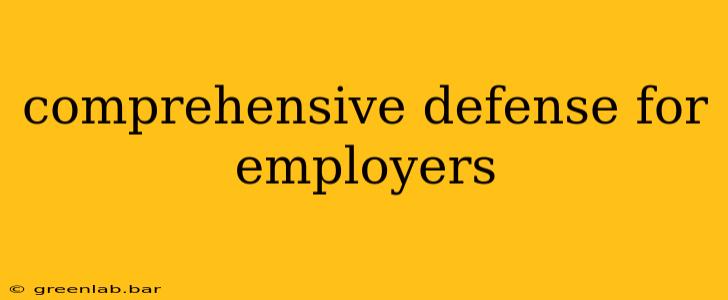Navigating the complexities of employment law can be challenging for even the most seasoned employers. This guide provides a comprehensive overview of strategies for building a robust defense against potential legal challenges, minimizing workplace risks, and fostering a positive and productive work environment. We'll explore preventative measures, proactive compliance strategies, and effective responses to potential litigation.
Proactive Measures: Preventing Employment Disputes Before They Arise
The best defense is a good offense. Proactive measures significantly reduce the likelihood of facing employment-related lawsuits. These include:
1. Establishing Clear and Consistent Policies & Procedures:
- Comprehensive Employee Handbook: A well-drafted handbook outlining company policies on everything from harassment and discrimination to attendance and performance expectations is crucial. Ensure it's regularly updated to reflect changes in employment law.
- Consistent Enforcement: Fair and consistent application of policies is paramount. Unequal treatment can lead to claims of discrimination or unfair dismissal.
- Regular Policy Reviews: Employment laws are constantly evolving. Regularly review and update your policies to ensure compliance.
2. Thorough Hiring and Onboarding Processes:
- Structured Interviews: Use standardized interview questions to avoid bias and ensure all candidates are evaluated fairly.
- Background Checks (Where Legal): Conduct appropriate background checks (in compliance with relevant laws) to mitigate potential risks associated with hiring.
- Comprehensive Onboarding: A robust onboarding program familiarizes new hires with company policies, procedures, and expectations, fostering a culture of compliance.
3. Fostering a Culture of Respect and Inclusion:
- Diversity & Inclusion Training: Regular training on diversity, equity, inclusion, and preventing harassment and discrimination is vital.
- Open Communication Channels: Create a safe space for employees to voice concerns and report issues without fear of retaliation.
- Zero-Tolerance Policy: Clearly communicate a zero-tolerance policy for harassment, discrimination, and retaliation.
Responding to Allegations and Potential Litigation:
Even with preventative measures in place, employment-related disputes can still arise. A strong defense requires:
1. Prompt and Thorough Investigation:
- Internal Investigation Team: Establish a dedicated team to conduct impartial and thorough investigations into any allegations of misconduct.
- Documentation: Meticulously document all aspects of the investigation, including interviews, evidence gathered, and conclusions reached.
- Legal Counsel: Consult with experienced employment law counsel early in the process to ensure compliance with legal requirements and to develop a sound legal strategy.
2. Preserving Evidence:
- Data Retention Policy: Implement a data retention policy that complies with legal requirements and ensures the preservation of relevant electronic and physical evidence.
- Chain of Custody: Maintain a clear chain of custody for all evidence collected during an investigation.
- Confidentiality: Maintain confidentiality throughout the investigation to protect the privacy of all involved parties.
3. Strategic Legal Representation:
- Experienced Employment Lawyers: Retain experienced employment lawyers who understand the complexities of employment law and can effectively represent your interests.
- Collaboration with Counsel: Work closely with your legal counsel to develop a comprehensive defense strategy.
- Preparation for Litigation: If litigation becomes unavoidable, be prepared with thorough documentation and a strong legal strategy.
Conclusion: Building a Strong Defense is an Ongoing Process
Protecting your company from employment-related lawsuits requires a multifaceted approach. By implementing proactive preventative measures and establishing a robust system for responding to allegations, employers can significantly reduce their risk and build a strong defense against potential litigation. Remember, proactive compliance is not just about avoiding legal trouble; it's about fostering a positive, productive, and inclusive workplace that benefits both employees and the organization as a whole. This comprehensive strategy ensures long-term success and sustainability for any business.

